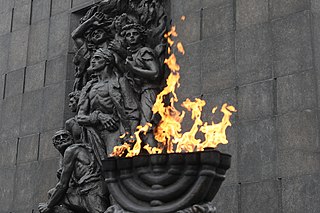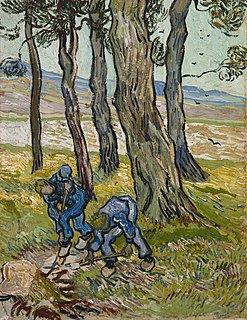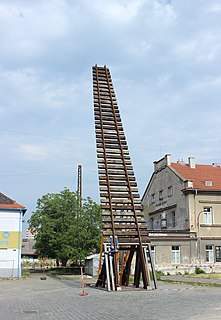
The history of the Jews in Poland dates back at least 1,000 years. For centuries, Poland was home to the largest and most significant Ashkenazi Jewish community in the world. Poland was a principal center of Jewish culture, because of the long period of statutory religious tolerance and social autonomy which ended after the Partitions of Poland in the 18th century. During World War II there was a nearly complete genocidal destruction of the Polish Jewish community by Nazi Germany and its collaborators of various nationalities, during the German occupation of Poland between 1939 and 1945, called the Holocaust. Since the fall of communism in Poland, there has been a renewed interest in Jewish culture, featuring an annual Jewish Culture Festival, new study programs at Polish secondary schools and universities, and the opening of Warsaw's Museum of the History of Polish Jews.

Stuart Elliott Eizenstat is an American diplomat and attorney. He served as the United States Ambassador to the European Union from 1993 to 1996 and as the United States Deputy Secretary of the Treasury from 1999 to 2001. For many years, and currently he has served as a partner and Senior Counsel at the Washington, D.C.–based law firm Covington & Burling and as a senior strategist at APCO Worldwide.

The Reparations Agreement between Israel and the Federal Republic of Germany was signed on September 10, 1952, and entered in force on March 27, 1953. According to the Agreement, West Germany was to pay Israel for the costs of "resettling so great a number of uprooted and destitute Jewish refugees" after the war, and to compensate individual Jews, via the Conference on Jewish Material Claims Against Germany, for losses in Jewish livelihood and property resulting from Nazi persecution.

The German word Wiedergutmachung after World War II refers to the reparations that the German government agreed to pay in 1953 to the direct survivors of the Holocaust, and to those who were made to work at forced labour camps or who otherwise became victims of the Nazis. The sum would amount, through the years, to over 100 billion Deutsche Mark. Historian Tony Judt writes about Wiedergutmachung:

Nazi plunder was the stealing of art and other items which occurred as a result of the organized looting of European countries during the time of the Nazi Party in Germany. The looting of Polish and Jewish property was a key part of the Holocaust. The plundering was carried out from 1933, beginning with the seizure of the property of German Jews, until the end of World War II, particularly by military units which were known as the Kunstschutz, although most of the plunder was acquired during the war. In addition to gold, silver, and currency, cultural items of great significance were stolen, including paintings, ceramics, books, and religious treasures.

Aryanization was the Nazi term for the seizure of property from Jews and its transfer to non-Jews, and the forced expulsion of Jews from economic life in Nazi Germany, Axis-aligned states, and their occupied territories. It entailed the transfer of Jewish property into "Aryan" or non-Jewish, hands.
The Conference on Jewish Material Claims Against Germany, or Claims Conference, represents the world's Jews in negotiating for compensation and restitution for victims of Nazi persecution and their heirs. According to Section 2(1)(3) of the Property Law of Germany, the claims Conference is a legal successor with respect to the claims not filed on time by Jewish persons. This fact was reasserted in decisions of some lawsuits which attempted to redefine the Claims Conference as a "trustee" of these assets. These lawsuits were dismissed. The Claims Conference administers compensation funds, recovers unclaimed Jewish property, and allocates funds to institutions that provide social welfare services to Holocaust survivors and preserve the memory and lessons of the Holocaust. Julius Berman has led the organization as chairman of the board, and currently president, as of 2020.

The Holocaust had a deep effect on society both in Europe and the rest of the world, and today its consequences are still being felt, both by children and adults whose ancestors were victims of this genocide.
Anti-Jewish violence in Poland from 1944 to 1946 preceded and followed the end of World War II in Europe and influenced the postwar history of the Jews as well as Polish-Jewish relations. It occurred amid a period of violence and anarchy across the country, caused by lawlessness and anti-communist resistance against the Soviet-backed communist takeover of Poland. The estimated number of Jewish victims varies and ranges up to 2,000. Jews constituted between 2% and 3% of the total number of victims of postwar violence in the country, including the Polish Jews who managed to escape the Holocaust on territories of Poland annexed by the Soviet Union, and returned after the border changes imposed by the Allies at the Yalta Conference. The incidents ranged from individual attacks to pogroms.

Israel–Poland relations comprise diplomatic relations between Israel and Poland. At least 220,000 Israeli citizens are of Polish-Jewish origin. Both countries are members of the Organisation for Economic Co-operation and Development, the Union for the Mediterranean, and the United Nations.
The Holocaust Era Asset Restitution Taskforce or Project HEART (2011-2014) was a Holocaust restitution project that was created by a decision of the Israeli Government to locate Holocaust victims and their heirs and the property that was taken from them during the Holocaust and to assist in obtaining restitution for that property. Restitution would have been sought using databases containing the data submitted by Holocaust victims and their heirs and information about the property that was taken from them. Those who were interested in participating were directed to fill out a questionnaire to determine their eligibility and may also have accessed a website and call center for assistance. Questionnaires had been collected and processed by an administrator and then forwarded to the Israeli Government, which had planned to negotiate with the relevant Governments, companies and others who hold Holocaust assets. This project used innovations, such as the Internet, not used in previous restitution attempts and marked the most serious attempt at obtaining restitution for aged Holocaust victims and their heirs. By April 2014 the project lost 95% of its funding, is accepting no requests, and it has eventually been absorbed into the Israeli Ministry of Senior Citizens, from which the funding into the project were coming.
The European Shoah Legacy Institute (ESLI) was a public-benefit corporation based in Prague, in the Czech Republic whose purpose was to oversee the return of Jewish art and property seized by the Nazis during The Holocaust.
The Amendment to the Act on the Institute of National Remembrance of 2018 is a Polish law that penalizes public speech which attributes responsibility for the Holocaust to Poland or the Polish nation. Article 2a, addressing crimes against "Polish citizens" by "Ukrainian nationalists", also caused controversy. The legislation is part of the historical policy of the Law and Justice party which seeks to present a narrative of ethnic Poles exclusively as victims and heroes. The law met with widespread international criticism, as it was seen as an infringement on freedom of expression and on academic freedom, and as a barrier to open discussion on Polish collaborationism, in what has been described as "the biggest diplomatic crisis in [Poland's] recent history".
The General Government was the German zone of occupation in Poland after the invasion by Nazi Germany and the Soviet Union in 1939, at the start of World War II. The General Government represented the middle portion of occupied Poland, with originally the West being under German control and the East under Soviet control. The basis for this split was to eliminate the Polish state and to turn all Polish nationals as stateless subjects, disregarding international law.

The Diggers or Two Diggers is an oil painting by Dutch artist Vincent van Gogh painted in late 1889 in Saint-Rémy-de-Provence, France. It is in the Detroit Institute of Arts (DIA), Detroit, Michigan, United States. The Diggers is sometimes called Two Diggers among Trees to distinguish it from The Diggers , 1889.
The Terezin Declaration is a non-binding declaration that issued by 47 countries in June 2009, agreeing on measures to right economic wrongs that accompanied the Holocaust against the Jews and other victims of Nazi persecution in Europe. It is neither a treaty nor legally binding international agreement The Holocaust Era Assets Conference took place in Terezín, Czech Republic, the site of the Theresienstadt Ghetto. A year later 43 of the signatories endorsed a companion document, the 2010 Guidelines and Best Practices for the Restitution and Compensation of Immovable (Real) Property, which set best practices for immovable property. According to the guidelines restitution of the property itself is preferred, however when that is not possible payment or substitute property that is "genuinely fair and adequate" is possible. The declaration has no legal power and doesn't define how countries involved should act to fulfill it.

The Holocaust in Bohemia and Moravia, a portion of the Czech lands annexed into Germany, resulted in the deportation, dispossession, and murder of 80,000 Jews, most of the pre-World War II population, between 1939 and 1945.

Leo Bendel was a tobacco dealer and art collector.

The Holocaust in Austria was the systematic persecution, plunder and extermination of Jews by German and Austrian Nazis from 1938 to 1945. An estimated 65,000 Jews were murdered and 125,000 forced to flee Austria as refugees.
After World War II and coming to power of the communist government in Poland, large scale nationalization occurred. Following the fall of communism in Poland in 1989, some of the formerly nationalized property have been subject to reprivatisation and restored to previous owners, their heirs or other claimants.










